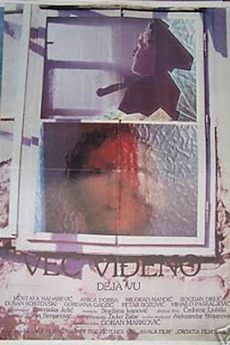 An interesting Yugoslavian thriller that uses the traditional first-person psychofilm framework to make political points, with the standard dark childhood flashbacks used to show the effect of past upheavals—in this case the introduction of communism in Belgrade—on those living in the present.
An interesting Yugoslavian thriller that uses the traditional first-person psychofilm framework to make political points, with the standard dark childhood flashbacks used to show the effect of past upheavals—in this case the introduction of communism in Belgrade—on those living in the present.
DÉJÀ VU (VEC VIDJENO) appeared in 1987. It was directed by Goran Markovic, one of Serbia’s top filmmakers; his other films include the horror-tinged VARIOLA VERA (1982) and TITO AND ME (1992). An estimable success in its native land, DÉJÀ VU was in the late eighties heavily hyped (at least by foreign film standards) in Britain and the US, where it was promoted as the “first” Yugoslavian psychothriller (1984’s STRANGLER VS. STRANGLER actually beat it to the punch), but it never caught on.
It begins at a piano recital in Serbia, where a strange man with a deformed left eye intently watches an old guy perform. From there we flash back to Belgrade, circa 1971, where the severely repressed middle-aged music teacher Mihailo is smitten with a fellow instructor, a blonde seductress named Olgica. Seeing a chance to advance her standing, Olgica initiates a carnal relationship with the understandably gob-smacked Mihailo. He however has trouble handling Olgica’s flighty, self-centered manner, and finds his already precarious mental state deteriorating.
Mihailo is afflicted by childhood flashbacks, none of which are especially pleasant. His gruff father, we learn, was hell-bent on turning the young Mihailo into a musical prodigy, and forced him to play the piano for hours at a time. As for Mihailo’s mom, she wasn’t thrilled with the old man’s philandering ways and left. Around that point communism strengthened its grip on Serbia, a fact that tied in directly with the disintegration of the young Mihailo’s family. When Mihailo reached his teen years he was forced to witness his father tried in court and eventually executed by authorities. Shortly thereafter his mother died from tuberculosis.
Back in the present the tipping point for Mihailo arrives when he and Olgica are rehearsing for a TV talent show, he as pianist and she as choreographer. On the day of the broadcast Mihailo’s mental problems interfere with his piano playing, and a supremely pissed-off Olgica shuns him.
This causes Mihailo to snap completely. He enters Olgica’s house, where he kills her dog and stabs her elderly father through the throat. The bloodletting reaches truly hellacious heights once Olgica arrives home with a new boyfriend in tow, neither of whom, you can be sure, are long for this world…
This being a Yugoslavian production from the eighties, one has to be forgiving of its technical sloppiness. This is evident in the cut rate sound design and substandard score (see below). The visuals, at least, are impressively wrought, with an arresting lighting scheme that always leaves a portion of every scene in darkness and roving Brian De Palma-like camerawork that revels in lengthy tracking shots (plus, unlike most Yugoslavian films from the eighties, the available prints aren’t massively faded and scratched).
Director Goran Markovic does a good job delineating between the film’s three time periods, each of which has its own visual signature—although Markovic’s penchant for hazy diffusion (a quintessentially eighties technique beloved by Ridley Scott) doesn’t always work, resulting in a lot of distractingly smoke-filled interiors.
Another element that doesn’t work is the classically based music score, with its absurdly over-dramatic cues that accompany the protagonist’s psychotic freak-outs and plinky piano music that plays over the emotional scenes. The rousingly gory climax is the one place where the score actually does its job, with stately piano music making for a perverse corollary to the action, which rises to a memorable pitch of bloody insanity.
Vital Statistics
DÉJÀ VU (VEC VIDJENO)
Art Film 80/Avala Film/Croatia Film
Director: Goran Markovic
Producer: Aleksandar Stojanovic
Screenplay: Goran Markovic
Cinematography: Zivko Zalar
Editing: Snezana Ivanovic
Cast: Mustafa Nadarevic, Anica Dobra, Milorad Mandic, Bogdan Diklic, Dusan Kostovski, Gordana Gadzic, Vladimir Jevtovic, Petar Bozovic, Mihailo Paskaljevic, Vesna Trivalic, Olivera Markovic
